Russia
This platform places Russian documentary drama within the broader context of theatre for social change in Belarus and Ukraine. This digital project shows to what extent Russian docudrama been a humanitarian project since its inception in the early 2000s. Along the way, it shows how Belarusian, Ukrainian, and Russian docudramatists have been in peaceful dialogue with one another through collaborations at festivals and workshops since the early 2000s.
For the creation of a documentary drama, the playwright—who is often also the actor—selects the site of a particular subculture to study, enters its habitus and conducts interviews with people of that subculture. Docudrama spread to Russian theatre after playwrights and directors from the Royal Court Theatre in London in 1999 went to Moscow to teach the method. The playwrights Mikhail Durnenkov, Ivan Vyrypaev, Elena Gremina and Mikhail Ugarov attended the first seminars. By now documentary drama is a transnational movement used notably in Belarus, at Belarus Free Theatre, where Russian is the most commonly used language, and in Ukraine, at Theatre of Displaced People, where the use of Russian was relatively unproblematic until the occupation of Crimea and the civil discord within Ukraine rendered it a contentious issue.
It is precisely in the theatre, with its inherent form of critique and reflection
provided by the structure of the stage, where the contemporary moment of the present can be held at arm’s length away, which creates enough of a distance from the present for a historical perspective to emerge. Moreover, the goal of documentary theatre in Russia is to transform the audience’s outlook, which often is attached to popular stereotypes. Docudrama provokes in them an agitation toward the unordinary texts placed before them and their embodied form. The public is in the middle of an experiment (“Цель документального театра — трансформировать взгляд зрителя,
часто пребывающего во власти тех или иных стереотипов, вызвав в нем смятение от столкновения с необычными текстами и их воплощением. Публика находится в центре эксперимента.” («О драме в современном театре: Вербатим» A Verbatim Manifesto, edited by Ilmira Boliatin. Available in this digital archive).
- The Dramas
- Gallery
- Manifestos
- Videos
First Man
In Anti-Oedipus: Capitalism and Schizophrenia, Deleuze and Guattari write, “reality is what actually happens in a factory, in a school, in barracks, in a prison, in a police station” (1977, 212). Marginalized social groups represented in contemporary documentary plays written in Russian include those whose voices are from the factory, school, barracks, prison, or police station (often for unjust charges). They are the voices that are silenced in the news and in political debate. Through the recorded voice of the subaltern the audience or reader receives insight about this reality of the post-Soviet setting. The plays made out of interviews and eye-witness testimonies are about domestic violence, survivors of sexual assault, HIV infection, migrant labor, and injustice in the judicial system. To apply Spivak’s terms to Russian docudrama, no longer are those who act and struggle mute. The first documentary drama was written by Elena Isaeva, First Man (2003). It was based on interviews with women who were victims of sexual violence.
Motovilikhinskii Worker
Docudrama’s recorded speech, given by those who have lived through the reality of social problems, recreates the conditions of a tumultuous environment, in particular when the sound of its descriptive words is preserved on the voice recorder and then retold to an audience. The speech in Motovilikhinskii Worker coheres into scenes that respond to certain prompts asked by Rodionov, such as “Where do you work?” or “What is good and what is bad in Perm’?” When a blacksmith is asked if he is ever sad, he responds that sadness does not happen. He corrects his statement, saying that his collective “tries not to get sad” and “tries to think positively. [Thinks]. In principle, I’d say, it always works.” Rodionov cuts the rest of the speech so that the play ends on the note of this humble being who will work arduously his whole life to afford one room and fishing trips during his retirement. In the context of docudrama the original source is reality. The utterances in docudrama’s reported speech cite reality, break off words from the reality where they were recorded, and then reproduce that environment when reported on stage.
Bolotnaia Square Case
It is logical to presume that when social critique is fostered in the theatre, the theatre can be a gateway for larger activist movement on the street. Actors, playwrights, and audience members might not run straight to a volunteer organization after each show, but regularly several do take
part in Subbotniki (Saturdays-ings), community and volunteer work that takes place on Saturdays, a tradition practiced in Soviet Russia, now rekindled by Teatr.doc. Teatr.doc has had a significant impact on the young generation, which, between 2010 and Putin’s reelection in 2012, began Russia’s most serious protest movement in the past three decades. Crowd sizes grew
as much as 100,000 or more, until the great crackdown that took place on May 6, 2012, the day before the inauguration of Putin to a third term. Exercises of social critique and dissent against Putin were practiced at Teatr.doc in, most ostensibly, Bolotnoe Delo (2015), about those
imprisoned after protesting Putin’s unconstitutional third term as President, and BerlusPutin (2012) about a ruling creature who is half Silvio Berlusconi, Italian media tycoon and politician, and half Vladimir Putin.
Uzbek
Uzbek / Узбек (2013) is an autobiographical account of Talgat Batalov’s migration from Uzbekistan to Russia for procuring a passport while avoiding military conscription. Through story-telling and a syncretic collection of newspapers, official letters, and passports, the audience was pushed and prodded to learn about current issues related to migrant work, immigration, and to look at the concept of national identity through the lens of immigration. The play, co-authored by the actor, director, and playwright Talgat Batalov and by Ekaterina Bondarenko, was showcased in the 2013 Golden Mask Festival and in the prestigious Russian Case that year. Talgat Batalov also performed in it and directed it.
When the documents hit the stage, the performance did not interpret the documents into an overt political message, but rather, through its artistic design, provided the space in which the documents themselves “spoke” directly to the audience. While Brecht’s Lehrstücke critiqued capitalist Weimar Germany, New Drama writers are not didactic; they do not offer conclusions about the suffering of characters in a post-communist landscape. New Dramatists adopt this particular position as a result of the post-Soviet condition. Their refusal to offer conclusions ad-hoc, after the fall of the Soviet Union, goes hand in hand with the New Dramatists’ parallel refusal to imagine a new critical language different from the language (of trauma) used by Russian civilians and marginal subcultures.
Reported speech on stage is not “acted out” because then the actor would be trying to explain and rationalize the situation. Practiced distance from a role is employed as a mechanism for participatory art: when the actor does not take responsibility for the role, it shifts the burden of authenticity onto the audience. New Drama writers shape their script and performances around helping the audience form their own opinion about the material presented. This method of pedagogy is docudrama’s performance art.
Novaia Antigona
Novaia Antigone was written by Elena Kostiuchenko. The play responds to police’s violent response to protests in 2016 by women who lost their children in the Beslan Tragedy in 2004. The women blamed Putin’s government for injustice. In response, police arrested several of the mothers. Kostiuchenko based the play both on the 2016 protest and on Euripede’s Antigone,
which is about how natural, family law and moral code stand up to state law.
Antigone’s defiance of the laws of Creon and the state come alive in Teatr.doc’s Novaia Antigona. Teatr.doc’s play also shows us that documentation is not at all opposed to myth-making, both ideological and individual. Although synthesizing myth and the documentary in a
docudrama performance such as Novaia Antigona seems absurd, there are many literary theories about myth that overlap with the goals of docudrama. One definition is Claude Levi-Strauss’s “The Structure and Form of Myth” (1955). In his essay, Levi-Strauss explains that 1) Myths can organize a society into a structure that exposes contradictions in it. 2) Myths that can resolve the conflicts might not be straightforwardly representative of one specific historical era only because they relate to both the context from which they derive and can relate to the future. “Mythical time,” according to Levi-Strauss, is a double structure – it can be used among other cultures.
Russian docudrama uses Antigone’s natural law to make sense of real life by apply a moral code to it. In this same way, Russian docudrama has the potential to be an enduring literature, too.
Novaia Antigona is the sequel to September.Doc, which was written by Elena Gremina in Mikhail Urgarov in response to the 2004 Beslan tragedy when school children and teachers in North Ossetia were killed by Chechen and Ingush terrorists and subsequent Russian counter-terrorist intervention. The playwrights collected seventy-seven text fragments of Chechen and
Russian open-editorials and purported eye-witness accounts posted on Internet blogs after the tragedy and then compiled them into a montage. September.Doc actors alternate speaking one cluster of biased comments presented from one side (arguably pro-Russian) with another cluster of explanatory remarks from the other side (arguably pro-Chechen). When watching September.Doc, the audience indeed feels like a jury member, judging which side is to blame and who is innocent. New Drama is designed to work out the meaning of problems and trauma together with the audience.
September.doc in the original can be found in the 2019 two-book volume entitled, Plays and Texts / Пьесы и тексты (New Literary Observer) by Mikhail Ugarov and Elena Gremina and in English in Russian New Drama: An Anthology, eds. Weygandt and Hanukai (Columbia UP, 2019).
How Estonian Hippies Took Down the Soviet Union (Как эстонский хиппи разрушили советский союз, 2017) by Mikhail Durnenkov
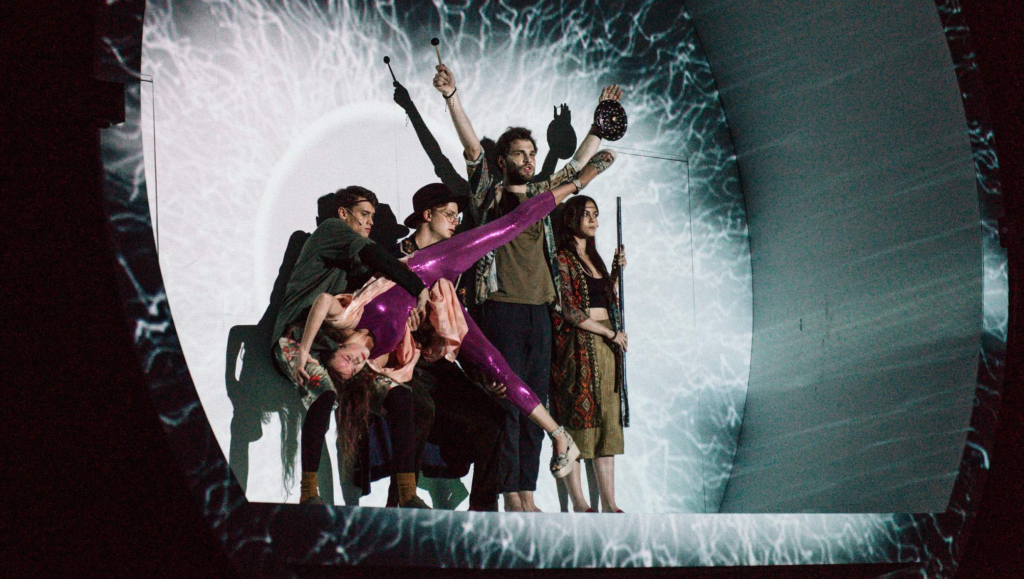
It’s 1972. Tallinn. Six brave people, who are unable to cognize the world according to the Komsomol code of builders of communism, expand reality with the help of improvised means. The friends use “Sopals” stain remover, “wheels” and other substances obtained in the “nuthouse,” in the Square, where there are “children’s mushrooms,” such as described by Vysotsky’s lyrics.
The company of hippies is taken to the police, referred to in the play as the astral. In the astral they see a real Soviet Buddhist monastery. There, Lennon (one of the six hippies) says that the spirit of the real John has entered him, who tells him to tell them that the All-Union gathering of hippies is a trap set by security guards, and they must not go there. Astrals, disguised as monks, suddenly hand the company an iron flute, an ancient Taoist instrument, which is impossible to play (a nod to Hamlet). If you come to Red Square and can extract the sound, then you will extinguish the Kremlin’s eye forever, which is hidden in the Mausoleum. And as soon as you extinguish it, that’s the end of the Soviet fairy tale.
Add your content here…
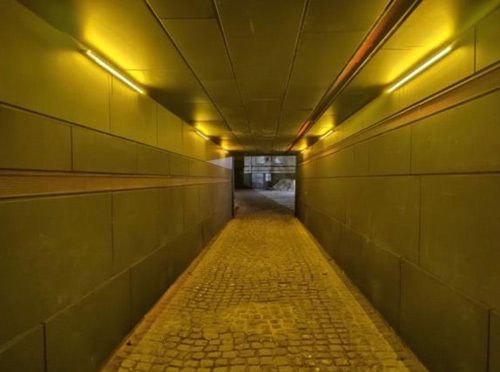
“Вербатим: Метод” by Mikhail Ugarov.
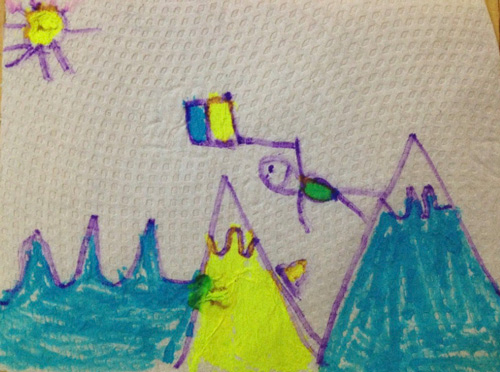
Bolotian, Ilmira. “ ‘Doc and Dogma: Theory and Practice // «Док» и «Догма»: теория и практика” // Театр. №19, 2015.
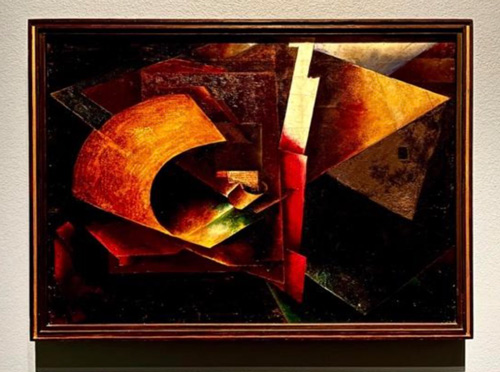
“О драме в совремменом театре: Verbatim.” Questions of Literature / Вопросы литературы, 5, 2004: 23-42.
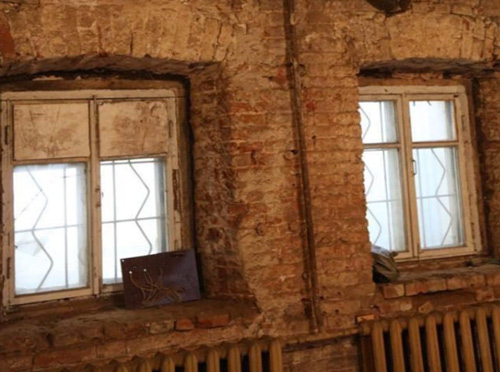
Ugarov, Mikhail. “What is Verbatim? / Что такое Вербатим?” OpenSpace.ru. February 1, 2002.
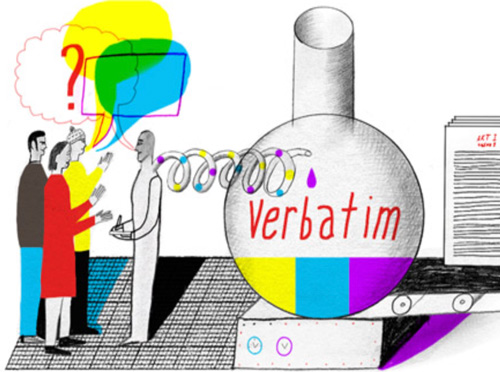
Verbatim: How Teatr.doc Began
Aleksandr Rodionov, Театръ / Teatr. 09. March 2019
Translated by Csenge Nage
Edited by Elena Susanna Weygandt
1. Verbatim
Like Ibsen’s Brand – the unattainable and the necessary – Man seeks true theatre. Like Goethe’s Faust – unseen but great – Man anticipates the true theatre. Meanwhile, in the low valleys, the lemurs are fucking lemurs with their small, flickering, ever-renewing, one-day technological revolutions, replacing the instantly obsolete ones. Seventy years before the events we are describing, lemurs invented the portable voice recorder. The tape recorder was invented earlier, but the portable recorder was invented on the cusp of the ‘40s.
By the photographer catching a moment with a snapshot, by choosing the angle and close-up with a hand-held apparatus, the photographer can become a photo-reporter, a photojournalist. He who did not adjust the world to his lens, but came into the fluid world with a lens, became a probe, and was thus able to invade the medium, to witness the moment.
Let he who catches other people’s words go to the place where people talk to each other, and then those other people’s speech will remain free. It’s not only about feeling the alienness of another voice, preserving the alienness of another’s tone, style, and thinking when importing a line – into a poem, into an essay, into a play – but it’s also about taking journey into the environment, a pilgrimage to the fact: this is what the portable means of audio recording allows. In those years, when Verbatim playwriting was born, it was thanks to the dictaphone/voice recorder.
Indeed through the twentieth century, various individual seekers have picked up voice recorders for their writing. An Englishman in the ‘70s brought a tape recorder to a town where ironworkers were protesting the slow, ruthless closure of their plant, gave the recorders to the workers, recorded the rallies of the fighters, and the meetings of the enemies. And then he brought these voices together, brought them to life in the arena under the gaze of the audience, in the merging time of the evening’s performance. People came to listen “to themselves” – and came out puzzled but united. The decision to close the plant was cancelled. A miracle had happened. So it goes in The Fight for The Shelton Bar by Peter Cheeseman, 1974.
There was another case. Racial unrest and disturbances in America. A woman in the ‘80s recorded the monologues of victims and supporters and enemies on the street. And took them all in. Like a person possessed by many voices, she retold their stories in succession, a schizophrenia of arguing opinions and incompatible truths. She changed hats and caps, plasticity and facial expressions – but the main means of persuasion proved to be the intonation, the rhythm, and the melody of the documentary speech. The voice recorder catches not only the words, but the speaker’s speech image. Enemies came to see the play, watched, listened, and forgave each other. So goes Fires in The Mirror, by author and performer Anna Deavere-Smith, 1989.
And then came the 1990s, and after the world became burned by global propaganda, it suddenly seemed that all speaking was not revelation but substitution, all testimony was not truth but a version, all empathy was not insight but blindness. And Verbatim was nearly forgotten – until 1998.
2. Ugarov
Mikhail Ugarov is the author of plays that have been recorded. The power of them is not only in the voices of the characters, but also in the voice of the stage directions. When Ugarov heard about Verbatim, it was 1999. A woman from the British theatre Royal Court came to Moscow, looking for interesting plays around the world, and in Moscow she spoke at a performance about the diversity of British theatre and said, “here is an example of Verbatim, a play based on the real, living words of real people.” Ugarov, then a playwright, sometimes a scriptwriter, once an artist and not yet a director, had already stepped aside to try some “hard bread” in a type of TV program of that time— a talk-show about quarrels in the studio and passions behind the scenes—where he was working as an editor. The stories came also by post in 1999. Real, living stories, barely available to be cast in short and semi-improvisational sketches, but ready to be played by real, living people. Ugarov, the editor-in-chief of a new plant for processing life dramas, once said there, “What a pity it is that the stories, the voices from these letters, are incompatible with today’s stage; is it impossible to think of a way to show them in the theatre, so that such stories become plays, but that the plays do not lose their thrilling authenticity? It’s improbable, but possible. Let me try to explain: the plays will meet at the conjunction of improbability with credibility. Where the unimagined dramaturgy has the right to be improbable because it feels authentic. When Mikhail Ugarov learned about Verbatim, he did not seem to care so much about technical accuracy (Verbatim means ‘word for word’). In his personal dictionary, Verbatim became the literal means for this unformulated union of improbability and authenticity.
3. Ugarov, Verbatim
Verbatim came into the temple of Russian theatre through an empty hallway. This obscure concept started among neighbors was brought in through the basement by squatters-playwrights. A person (playwright? actor?) interviews, deciphers someone else’s speech, sifts out the superfluous, and puts it in the desired order, which turned out to be… A monologue play? A cycle of monologues? It is unclear at the end but always exciting at the start because verbatim always begins with a foray into a parallel world.
After the first Verbatim workshop, Dmitry Brusnikin already suggested that Verbatim can be part of actors’ training. It helps them go into the world of the spectator, to find voices there, and listen to them. To go out of one’s own world into the world of unimagined dramas and return to the theatre without losing the weight of the Verbatim confessions received. Brusnikin was studying at the Moscow Art Theatre Studio School (in the courses of Oleg Efremov). He attended the Verbatim workshops with Ugarov, myself, and with Ukrainian playwright Maxim Kurochkin, and, would you believe it, by the end of the workshop, all had made their own monologues. Today these topics would seem particular to contemporary Russia: Kurochkin undertook interviews with contemporary mercenaries and with another group, migrants. Ugarov was looking for something else: he was interested in how the actor would reveal himself in the performance, how he would cease to be an actor when he carried another’s reported story on the stage. Through the process Ugarov was finding a new self in addition to discovering Verbatim: he became a teacher, or rather, a person who knows how to play with an actor in such a way that the actor ceases to be his former self, if only for a short while. And a director: that year Oleg Efremov died, and Ugarov decided to stage his own play, Bummer Off, written for the Moscow Art Theatre. Verbatim then became not a game, but a challenge. A device that gives us hope of being transported to a theatre from the world of 2000.
4. Ugarov, Teatr.doc
Teatr.doc began with the math of numbers, and Ivan Vyrypaev. The numbers game showed that it was cheaper to rent a permanent space and rehearse it, and perform in it, than to rent one-off rooms and stages for rehearsals and shows. And Ivan Vyrypaev moved to Moscow with his small theatre and two self-produced plays (one of them was even based on a real human document, What You Like, later named Dreams, a quartet of poetic and wounding monologues – the imprint of the fates of two pairs of Irkutsk drug addicts). This meant that if the Documentary Theatre Project opened its own venue, it would not become meaningless or empty.
Biography Forward, if I’m not mistaken, is Ugarov’s only Verbatim play. It’s the result of a question-game: the person answering must tell their future biography. To tell it as a given, as a fact, without the subjunctive mood. How I moved to another flat, how I got married, how my children got sick and grew up, how I got promoted, how I dyed my gray hair when I stopped hiding it, how I was afraid that my wife would die, how I died, how I was buried, what happened to me there, after my death. The interviewees spoke with hesitation at first, and then they began to answer confidently. These stories came together spontaneously during the question-game (or, rather, the best stories were unprepared, not connected with the hero’s dreams and plans). Together, Ugarov and his younger comrades from the Verbatim movement mined these stories, stored them, and showcased them. But this strange and marvelous idea never made it to stage.
As in the making of Biography Forward, the “in-depth interviews” (Mikhail Ugarov decided to call them that) became a laboratory for creating the text of the play. I didn’t participate, but I went to see the first few rehearsals. I filmed a couple of run-throughs on video, and then before we knew it, it was time for the premiere of the play, The Moldovan War for a Cardboard Box. The title and the main events in the play evolved from two pages of the play. Together with the work of the actors, Ugarov created a fabric that the actors could show without falsity – that’s how it seemed to me. His play did not import an unadventurous plot from reality, nor did it use Verbatim. The play was documentary in another way: in its relation to the life experience of the people playing it, in its treatment of the actor as a source, as a human document.
5. Teatre.doc and afterwards
Mikhail Ugarov staged at Teatre.doc September.doc in 2005, The Blue Machinist in 2007, and Life is Good in 2009. One Hour Eighteen, based on specially conducted interviews, began a new line in the work at Teatr.doc – a line of performance-replicas about intolerable injustice. Now, in the 2017/18 season, Ugarov has been working on a play about today’s Moscow anarchists: as far as I know, he started it with a series of interviews.
Verbatim has made a comeback over the years – thanks to computer transcription devices.
Verbatim in Russia has burst into a temporary hope for truth. It teleports reality to the stage, capturing life before it disappears on stage. Ugarov seems to have been looking for this very road for a while, inaccessible and undoubtedly enchanting.
Part 1 of One Hour Eighteen Minutes by Elena Gremina. Performance introduced by Mikhail Ugarov.
Part 2 of One Hour Eighteen Minutes by Elena Gremina. Performance introduced by Mikhail Ugarov.
Additional performance at Teatr.doc of One Hour Eighteen Minutes, with opening remarks by Mikhail Ugarov.

